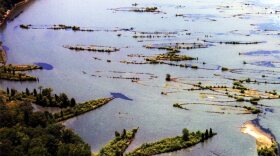President Donald Trump’s proposed budget eliminates all of the Chesapeake Bay Program’s $73 million and reduces or eliminates several other funds used to clean up the Bay and its watershed.
On Thursday, leaders from the six states in the Chesapeake Bay Watershed — who together form the Chesapeake Executive Council — signed a resolution calling on Trump and Congress to replace that money in the budget and urging federal agencies to remain active participants in Bay restoration efforts.
Thursday’s meeting did yield some good news.
Walter Boynton, a professor at the University of Maryland’s Chesapeake Biological Laboratory, rattled off several signs that the health of the nation’s largest estuary is improving.
“After decades of decline, water clarity is improving in some areas of the Bay,” he said.
He said sea grasses, an indicator of water clarity, have been expanding in the Bay, reaching nearly 100,000 acres in 2016 — nearly three times what it was when the Bay Program began in the mid-1980s.
“And during the late summer of 2016, there was no true dead zone in the Bay,” he said. “That’s the first time that’s happened in 30 years.”
But he emphasized that he was describing progress, not complete success — not yet anyway. He warned against cutting funding to the Bay Program, a sentiment that was echoed by almost everyone at the meeting.
“When you think of the progress we have made, we need the full funding of the $73 million to go forward because certain states, if we did not have this money, we know that they would not be able to meet the requirements that they need to do,” said Virginia Gov. Terry McAuliffe.
In addition to cutting money from the Bay Program, Trump’s proposed budget eliminates hundreds of millions of dollars from a variety of programs in multiple federal agencies that contribute to Bay restoration efforts.
The first part of Thursday’s meeting, which was closed to the public, emphasized the importance of making sure federal agencies remain active in helping to clean up the Bay, said Chesapeake Bay Commission Executive Director Ann Swanson.
“Environment should not be political. Chesapeake Bay should not be political,” she said. “And we should reach out to our congressmen, every one of them, and make sure that they’re working for all of the federal agencies to be funded for their Chesapeake Bay restoration work.”
Maryland Gov. Larry Hogan said he raised these concerns in a recent conversation with Environmental Protection Agency Administrator Scott Pruitt.
“I told him that we were very concerned about the cut in funding to the Chesapeake Bay that was proposed — actually not by the EPA, but by the budget office instead but — I told him how important it was. We talked about a number of issues,” he said. “And I got the impression that he’s very aware, very concerned.”
But Ken Wagner, Pruitt’s senior advisor for state and regional affairs, said at Thursday’s meeting that those budget cuts are not within the EPA’s control.
"It’s important to point out that we feel like the President’s budget is just a starting point, and that we’re committed to fully working with Congress to determine what the right amount of funding for all of the programs that empower states to do the business of environmental protection are," he said. "But [Pruitt] is committed to empowering states to do the business of environmental protection, and including the Chesapeake Bay."
Whether that empowerment comes with money is up to Congress, he said.
Chesapeake: A Journalism Collaborative is funded with grant support from the Clayton Baker Trust, The Bancroft Foundation, Michael and Ann Hankin, The Jim and Patty Rouse Foundation, The Rob and Elizabeth Tyler Foundation, and the Mid-Shore Community Foundation.










